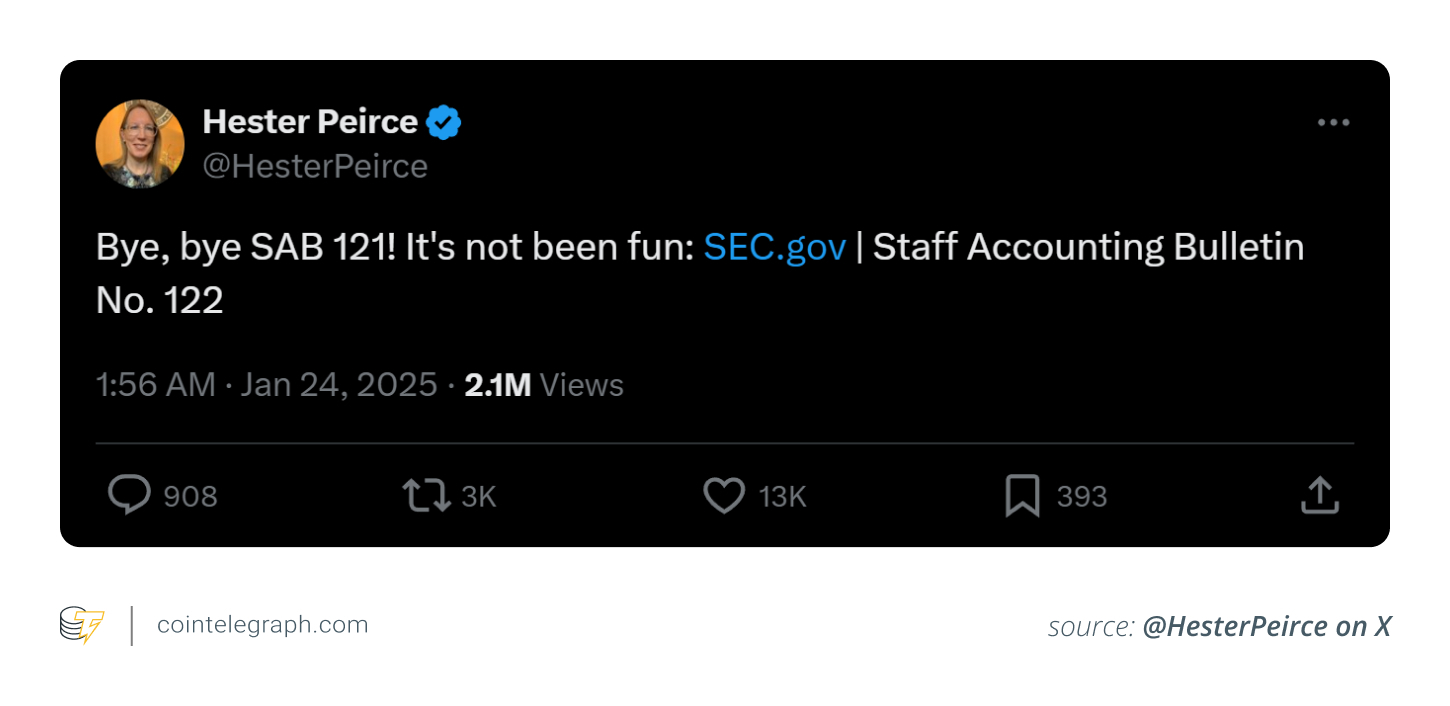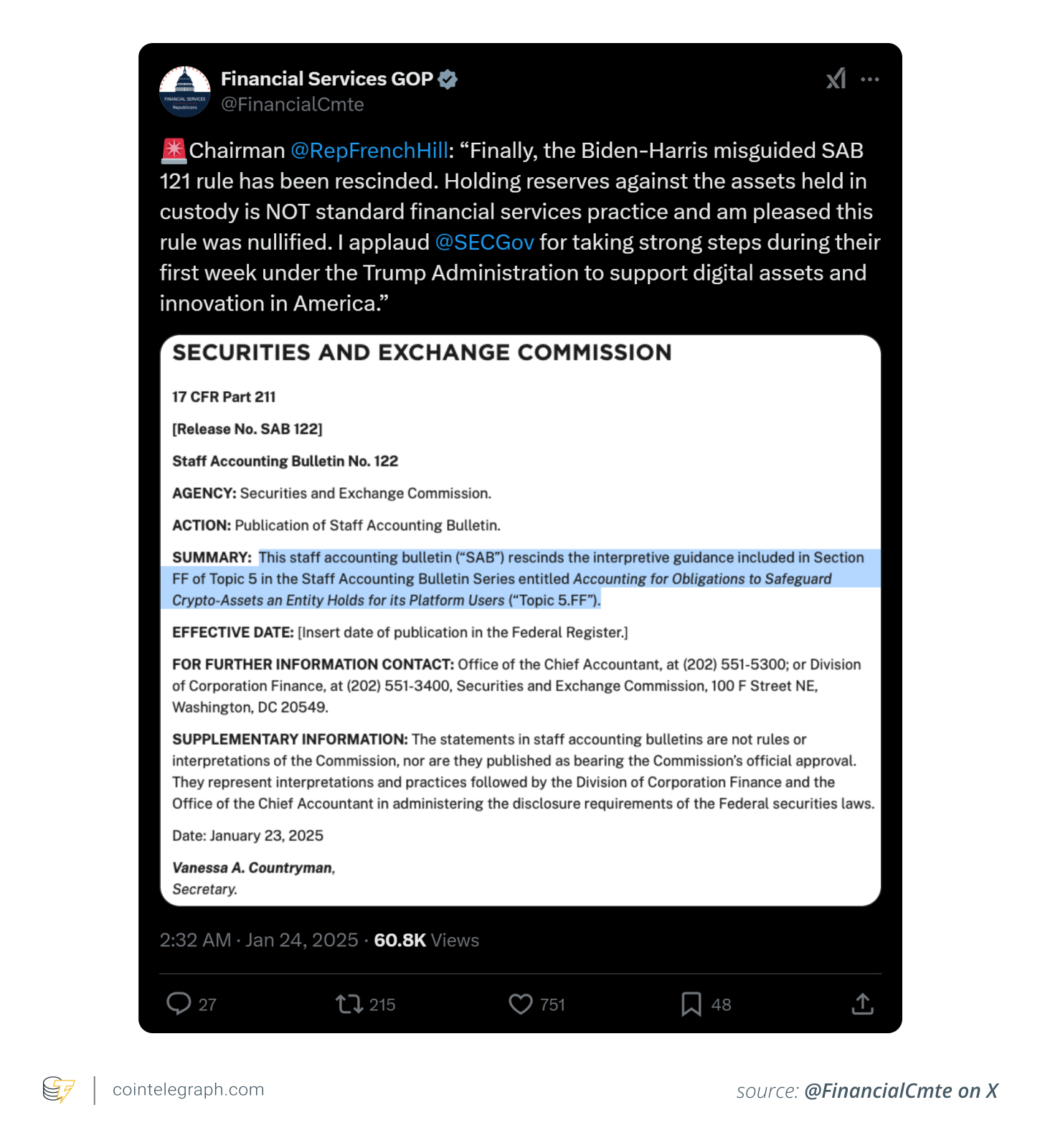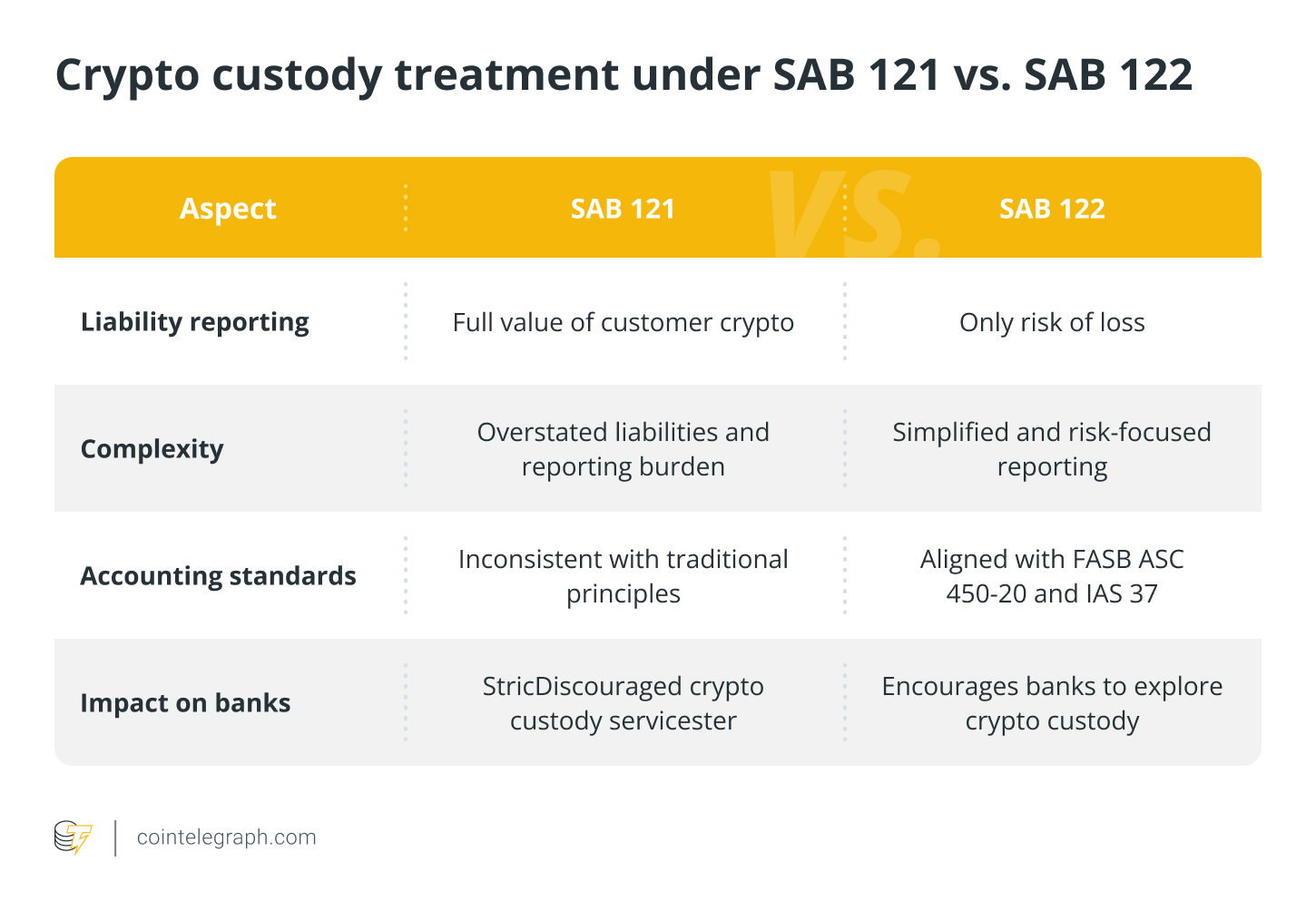What was SAB 121?
The Staff Accounting Bulletin (SAB) 121 rule was introduced by the SEC in March 2022 as part of its efforts to regulate cryptocurrency custody.
It required financial institutions to list any crypto assets they held on behalf of customers as liabilities on their balance sheets. In essence, it handled these digital assets like conventional custodial assets, such as cash or securities.
The crypto sector at the time opposed the rule for being burdensome, unduly complicated and not aligning with the unique nature of crypto assets. Many in the sector said it would limit the market’s growth and make it more difficult for institutions to provide crypto custody services.
For instance, the Government Accountability Office (GAO) initially called for a Congressional review of SAB 121, which led to a House and Senate vote to rescind it. However, then-President Joe Biden vetoed the repeal.
Following Donald Trump’s formal inauguration as the 47th President of the United States, the SEC announced the cancellation of this controversial rule on Jan. 23 and introduced SAB 122, effectively rescinding SAB 121.
Did you know? The “Securities Exchange Act of 1934” gave the SEC the authority to regulate exchanges and the financial market, helping shape the legal landscape for custodians and asset managers.
Industry reactions to the rescindment of SAB 121
The SEC’s decision to rescind SAB 121 came after ongoing criticism from industry stakeholders.
US Representative Wiley Nickel noted that the rule may have hurt American banks’ ability to custody crypto exchange-traded products (ETPs) at scale, which could have led to more power in the hands of non-bank entities.
SEC Commissioner Hester Peirce, who now leads the agency’s crypto task force, took to social media to express her relief, saying, “Bye, bye SAB 121! It’s not been fun.” This sentiment echoed the frustrations of many in the financial services and crypto sectors.

Several figures in the industry celebrated the rule’s rescindment, including House Financial Services Committee Chair French Hill, who tweeted that he was “pleased” to see the “misguided SAB 121 rule has been rescinded.”

SAB 122 explained: Key changes to look for
SAB 122 removes the guidance outlined in Topic 5.FF, which focused on accounting for obligations to safeguard crypto-assets held by entities for their users.
Key changes under SAB 122
- Liability assessment: Companies must assess whether safeguarding crypto assets creates a liability and measure it using established accounting standards, such as Financial Accounting Standards Board Accounting Standards Codification Subtopic 450-20 (FASB ASC 450-20) or International Accounting Standard 37 (IAS 37): Provisions, Contingent Liabilities and Contingent Assets.
- Retrospective application: The changes apply retrospectively for annual periods starting after Dec. 15, 2024, with an option for early adoption in SEC filings.
- Enhanced disclosures: Companies must continue providing detailed disclosures about safeguarding obligations, ensuring investors understand associated risks and obligations.
Let’s understand SAB 121 vs SAB 122 using an example. Imagine a company that safeguarded $1 million in crypto for customers; the entire $1 million was recorded as a liability on the balance sheet under SAB 121, inflating financial obligations. Under SAB 122, only the estimated risk of loss, such as $20,000 (2% of the total), is recorded, aligning with standard accounting practices .
In the above example 2% loss figure is hypothetical; SAB 122 requires institutions to calculate the actual risk of loss using their own data and risk assessments, rather than assigning an arbitrary percentage.

Did you know? The Financial Accounting Standards Board (FASB) was established in 1973 and has been crucial in setting standards that companies follow when accounting for various assets, including emerging digital assets like cryptocurrencies.
What does the rescinding of SAB 121 mean for crypto custody and regulation?
The repeal of SAB 121 simplifies crypto custody, encourages bank adoption and boosts trust in traditional finance.
Let’s find out what it means, particularly for financial institutions and their clients’s crypto custody:
- Simplified custody operations: Streamlining custody processes for organizations that custody cryptocurrency on behalf of their clients is one immediate advantage. Businesses will probably find it simpler to manage these assets within their existing systems if they are not required to classify cryptocurrency as liabilities.
- Increased trust in crypto custody: The general public may trust traditional financial firms that provide crypto custody as they abandon cumbersome and unnecessary regulations. This might represent a turning point in closing the divide between conventional finance and the cryptocurrency space.
- Encouragement for banks to enter the crypto market: The rescinding of SAB 121 removes a major barrier for traditional banks looking to offer crypto custody services. By eliminating the requirement to treat crypto as liabilities, banks may be more inclined to enter the crypto space, knowing they won’t face overly complex accounting requirements. This could lead to greater institutional involvement in the crypto market.
The SEC’s ruling suggests a possible move toward balanced regulation of cryptocurrency assets from a regulatory standpoint. Regulators may opt for nuanced measures that take into consideration the unique features of digital assets rather than enforcing general regulations that hinder innovation.
They may focus on emerging technologies, such as blockchain-based assets and decentralized financing (DeFi) , which have the potential to influence the financial industry for years to come.
That said, SAB 122 encourages banks to step into the crypto market and signals a shift toward more balanced, forward-thinking regulation for the crypto space.